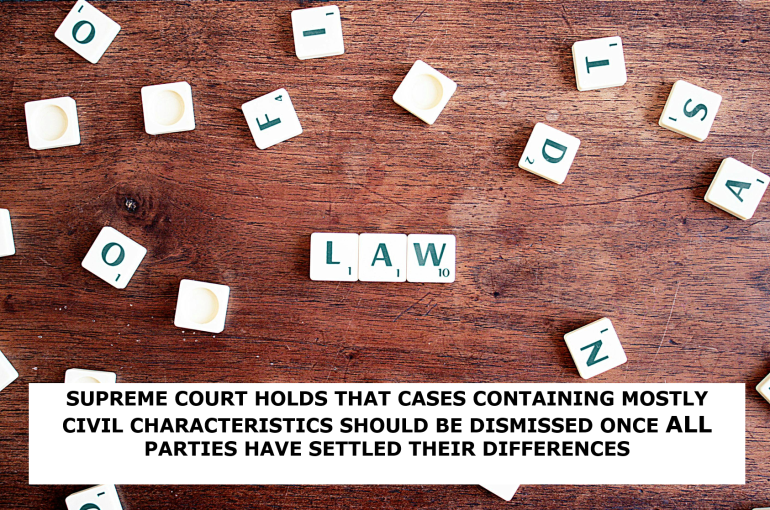Supreme Court holds that Cases containing mostly civil characteristics should be dismissed once all parties have settled their differences
A two Judge Bench of Hon’ble Supreme Court comprising of Justice B.R Gavai and Justice K.V. Viswanathan passed a judgement dated 03.10.2024 in the matter of K. Bharthi Devi and Anr. V State of Telangana & Anr. 2024 INSC 750 wherein the Bench held that criminal cases which are predominantly civil in nature, can be quashed when the parties have resolved their disputes amongst themselves.
Facts:
The case originated when the Accused No. 1-5 including the Appellants took the credit facilities from Indian Bank, Hyderabad (Bank). The credit was secured with collateral documents provided by the borrowers. Later, Accused No. 1-5’s loan account was later declared a Non-Performing Asset (NPA) in 2010 due to defaults in payment. Thus, the Bank filed a recovery case before the Debts Recovery Tribunal (DRT) bearing no. OA No. 253 of 2010.
While proceedings were ongoing at the DRT, the Bank discovered that some of the collateral documents provided were forged and fake. Based on the allegations, a complaint was filed with the Central Bureau of Investigation (CBI), leading to an investigation that found prima facie evidence of various criminal offences, including forgery, cheating, and criminal conspiracy. The Appellants were charged under Sections 420 (Cheating and dishonestly inducing delivery of property), Section 467 (Forgery of valuable security, will, etc.), Section 468 (Forgery for purpose of cheating), Section 471 (Using as genuine a forged document or electronic record), 120-B (Punishment of criminal conspiracy) of the Indian Penal Code, 1860 (IPC) and Section 13 of the Prevention of Corruption Act 1988 (Criminal misconduct by a public servant) before the CBI by the Bank and the Charge Sheet was filed by the CBI.
Despite the criminal investigation, the Bank and the borrowers reached a One Time Settlement (OTS) in 2015 for ₹3.8 crores, leading the Bank to issue a No Dues Certificate. Subsequently, the DRT closed the case based on this settlement.
The Accused, including the Appellants filed a Petition bearing no. CRLP-5778-2016 under Section 482 of Code for Criminal Procedure 1973 (CRPC) (Saving of inherent power of High Court) in the Telangana High Court to quash the Charge Sheet, arguing that since the matter was settled and the Bank had no further claim, continuing criminal proceedings would be pointless. Moreover, the case pending before the DRT was also disposed of as the parties reached a settlement and paid a sum of Rs. 3.8 crores. However, the High Court dismissed the said Petition, citing the public interest aspect of prosecuting fraudulent activities involving public funds, irrespective of a private settlement. The Hon’ble High Court vide judgement dated 01.09.2017 provided that mere settlement between the parties does not lead to quashing of criminal charges when public interest is also involved.
Thus, aggrieved by the of the Telangana High Court, the Appellants who are the wives of Accused No. 1 and 2 filed an Appeal before the Hon’ble Supreme Court to assail the Order dated 01.09.2017.
Issues:
- Whether the Appellants had an active role in forging the documents and shall be charged under the criminal provisions?
- Whether the dispute between the parties was initially of civil nature?
Decision by the Supreme Court:
The Apex Court relying on the facts and circumstances of the case observed that there are certain offences which arise out of civil disputes and hence such offences can be compounded even if they are non-compoundable in nature. The Hon’ble Supreme Court also noted that the quashing of criminal proceedings is decided on a case to case basis considering the facts and circumstances of each case. The Supreme Court recognized that the case had predominantly civil overtones arising from financial transactions between the bank and the borrowers. Since the dispute had been resolved, continuing the criminal proceedings would not serve the ends of justice, particularly against the Appellants, who played a minor role in the above-said financial transactions.
The Hon’ble Supreme Court noted that the Appellants (wives of the main Accused) were only implicated due to their relationship with the key Accused persons. The Hon’ble Court also noted that there was no substantial evidence attributing any active role to them in the alleged forgery.
The Apex Court relied on the judgement of Gian Singh v. State of Punjab and Anr. (2012) 10 SCC 303 and provided that-
In this case it was observed that certain offences which overwhelmingly and predominantly bear civil flavor having arisen out of civil, mercantile, commercial, financial, partnership or offenses arising from marital issues, particularly related to dowry, or family disputes, where the harm is primarily between the victim and the offender and they have resolved all disputes amicably, could be justifiably dismissed by the High Court, even if the offenses are not compoundable.
Thus, the Apex Court was in favour to quash the criminal proceedings against the Appellants as there was no concrete evidence against their involvement and the dispute seemed to be arising out of civil nature.
Conclusion:
The Supreme Court quashed the criminal proceedings against the Appellants and overturned the High Court’s judgment dated 01.09.2017. The Hon’ble Court held that, given the civil nature of the dispute and the settlement reached, continuing the prosecution would cause unnecessary oppression to the Appellants. The above judgment reflects the Court’s balancing of the civil aspects of financial disputes and the potential misuse of criminal prosecution after the settlement of the underlying civil claim.
ARJAV JAIN
ASSOCIATE
THE INDIAN LAWYER & ALLIED SERVICES





































Leave a Reply